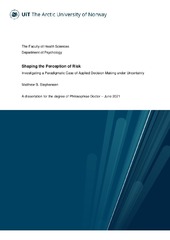Blar i forfatter "Stephensen, Matthew"
-
Deliberation Decreases the Likelihood of Expressing Dominant Responses
Martiny-Huenger, Torsten; Bieleke, Maik; Doerflinger, Johannes T.; Stephensen, Matthew; Gollwitzer, Peter M. (Journal article; Tidsskriftartikkel; Peer reviewed, 2020-09-11)Deliberation is commonly assumed to be a central characteristic of humans’ higher cognitive functions, and the responses following deliberation are attributed to mechanisms that are qualitatively different from lower-level associative or affectively driven responses. In contrast to this perspective, the current article’s aim is to draw attention to potential issues with making inferences about ... -
Liking and Perceived Safety across Judgments of Distinct Instances of a Category of Activity
Stephensen, Matthew; Martiny-Huenger, Torsten (Journal article; Tidsskriftartikkel; Peer reviewed, 2021-05-03)Prior research on the affect heuristic demonstrated that the more a person likes an object or activity, the safer and more valuable it is judged to be. That relation was found when judging stimuli at the categorical level (e.g., nuclear power, airplane travel, heart surgery). Yet risk judgments and decisions usually pertain to specific instances of an object or activity rather than their categorical ... -
Rethinking the Heuristic Traps Paradigm in Avalanche Education: Past, Present and Future
Johnson, Jerry; Mannberg, Andrea; Hendrikx, Jordy; Hetland, Audun; Stephensen, Matthew (Journal article; Tidsskriftartikkel; Peer reviewed, 2020-08-27)This paper will review the emergence and adoption of decision heuristics as a conceptual framework within the avalanche research and education community and demonstrate how this emphasis on the heuristic decision framework has anchored and was critical in redefining the discussion around avalanche accidents. This paradigm has been a critical and meaningful step in recognizing the importance of ... -
Shaping the Perception of Risk: Investigating a Paradigmatic Case of Applied Decision Making under Uncertainty
Stephensen, Matthew (Doctoral thesis; Doktorgradsavhandling, 2021-12-15)Risk and uncertainty characterise most human endeavours. Whether judging risk when buying a house, making a career change, considering marriage, or simply ordering food at an unfamiliar restaurant, each decision involves evaluating the available evidence to infer the likelihood of negative outcomes. Such decisions are often marked by uncertainty, the condition of incomplete knowledge about the ... -
Should I Judge Safety or Danger? Perceived Risk Depends on the Question Frame
Stephensen, Matthew; Schulze, Christin; Landrø, Markus; Hendrikx, Jordy; Hetland, Audun (Journal article; Tidsskriftartikkel; Peer reviewed, 2020-04-29)Linguistic polarity is a natural characteristic of judgments: Is that situation safe/dangerous? How difficult/easy was the task? Is that politician honest/dishonest? Across six studies (<i>N</i> = 1599), we tested how the qualitative frame of the question eliciting a risk judgment influenced risk perception and behavior intention. Using a series of hypothetical scenarios of skiing in avalanche ...


 English
English norsk
norsk



